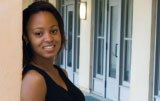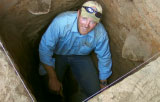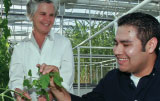Volume 24 · Number 2 · Winter 2007
Connections
Private support can make the crucial difference between whether some students attend UC Davis or not.
The Thin Green Line
The academic preparation of UC Davis students is renowned: Most freshmen enter here after collecting an “A” average in high school, and graduate students matriculate to UC Davis from the world’s top-tier universities.
What is not so well known are the challenges that many of these students must overcome to reach UC Davis.
UC Davis serves more economically disadvantaged students than do nearly all of the Ivy League universities put together. Twenty-eight percent of UC Davis undergraduate students are the first in their families to go to college, and about one-third are eligible for Pell Grants, with family income typically under $35,000 a year.
With the help of caring donors, UC Davis is committed to keeping the doors open. Scholarships and fellowship support ensure that exceptional students fulfill their educational dreams while raising the diversity and academic strength of the university. Here are the stories of three students for whom private financial support has made a profound difference in their lives and education. To read additional profiles, visit giving.ucdavis.edu.
Clarissa Thomas, Undergraduate

The first in her family to attend college, Boyd Scholarship recipient Clarissa Thomas hopes to inspire her sisters to pursue their educational dreams. (Karin Higgins/UC Davis)
Biochemistry major Clarissa Thomas strives to be a “ray of hope” for her younger sisters by blazing a new educational path. As the eldest of five daughters, she is the first person in her family to attend college. She plans to become an anesthesiologist and hopes that her accomplishments will inspire her sisters to pursue their dreams as well.
The Boyd Scholarship, which Thomas was awarded for both the 2005–06 and 2006–07 academic years, is helping her on her way. The scholarship, named in honor of the late Eugene and Kathryn Boyd of Sacramento, is given to a high-achieving student who is the first in his or her family to attend college. “Without the help of scholarships, college would have been an unfulfilled dream for me,” Thomas says.
Her greatest desire—to inspire her siblings to goals as lofty as hers—would undoubtedly please the Boyds. “My greatest source of motivation,” she says, “has been giving my younger sisters hope.”
Loukas Barton, Graduate Student

Graduate student and Hollaendar Fellowship recipient Loukas Barton follows the trail of hunter-gatherers turned agrarians in the Liu-p'an Mountains, China.(Photo: David Madsen)
In his quest to understand how people react to climate change, Loukas Barton has dug himself into a hole many times. Thanks to the Henrietta W. Hollaendar Fellowship and other support, those holes are anthropological, not financial. In the course of his Ph.D. research, Barton has traveled to sites in northern China to research the origins of agriculture and to examine the role of climate change in the transition from hunting and gathering to farming.
“There are bigger questions about this research that feed into current global problems,” Barton says. “We talk a lot about how important climate change is and how afraid we are of it. In essence, I look at the nuts and bolts of how people respond to climate change.”
Barton knows his work is important; and he’s aware that, without fellowship funding, he would not have attended UC Davis. “I wouldn’t be able to do any of the work I do without financial support,” Barton says.
David Silva, Alumnus

Sparling Scholarship recipient David Silva '05 examines a tomato plant with his mentor, Ann Powell, a research biochemist. (Corey Yeaton/Axiom)
David Silva ’05 wants to save the lives of people he’ll never meet.
Since he graduated with a degree in biotechnology, Silva has been applying the research skills he developed at UC Davis in Silicon Valley medical laboratories. His work has focused on medical research, including most recently screening compounds for therapeutic use to combat auto-immune diseases.
Silva’s UC Davis education was funded in large part by a scholarship created by Dixon-area ranchers R.E. and Hilda Sparling. Mrs. Sparling never had the opportunity to attend college and wanted to give Dixon students the chance to fulfill their educational dreams. The scholarship saved Silva and his family from taking on an onerous debt burden. It also made it possible for Silva to concentrate on his studies and pursue a professional path that matches his passions.
“I’m working on diseases that affect people’s lives,” Silva says. “Whatever job I do, I want it to have a direct impact on people.”
